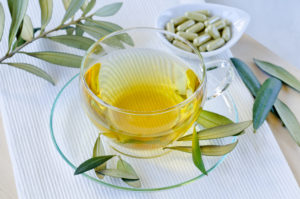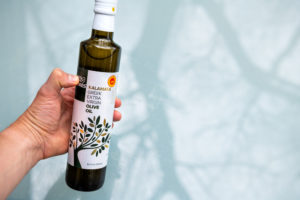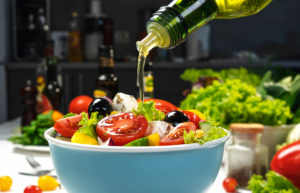What's On This Page?
ToggleOlives are something I’m fanatic about. I’ll eat any kind, any flavor, and time of day or night! I’m obsessed with them.
Olive oil is the liquid fat which comes from the olive tree. It is extremely high in oleic acid, which is known to reduce blood pressure. It also contains a good amount of natural vitamin E, carotenoids and oleuropein. That compound has strong anticancer and anti-inflammatory effects.
Olives are fruits, and both the fruit and the oil have medicinal benefits.
The main active ingredient in olive oil is oleic acid, some phenols and squalene.
Extra virgin olive oil or EVOO is sometimes referred to as cold-pressed. This type of oil is higher quality, better flavor and lower acidity than plain olive oil. When you see “extra virgin” on the label, that means something good. It means that the oil was mechanically pressed out of the olives, as opposed to using a bunch of chemicals to extract it. When the oil is squeezed and pressed from the olives mechanically, the vitamins, amino acids and fatty acids are not destroyed.
As far as the phenols go, the main ones are hydroxytyrosol and oleuropein. I give you their names so you can look up all the medical research at pubmed, and see all the incredible studies that prove pharmacological value when it comes to activities. These include:
Antioxidant protection
Anti-inflammatory effect
Hypoglycemic
Anti-plaquing
Anti-cancer
Antimicrobial
Antiviral
Lipid Lowering
Olive oil has such incredible medicinal virtues! It’s the reason that I formulated my Vitamin D with olive oil as the carrier. (Other brands don’t think two steps ahead, and they might suspend their D in very cheap, unhealthy oils.)
 You may have heard of olive leaf extract
You may have heard of olive leaf extract
A strong antiviral and antibacterial agent which also comes from the leaves of the olive tree. Olive trees grow all over the Mediterranean basin.
Greece is one of the world’s leading producers of extra virgin olive oil, and here’s a fun fact: Greek residents consume on average of 26 liters (almost 7 gallons) of olive oil, per person, per year!
Olive oil has been shown to confer a protective effect on cancers of all types. You can read about those results by CLICKING HERE.
More specifically, there is research to show olive oil consumption may help reduce incidence of cancer, including (but not limited to) colorectal, uterine, breast, prostate, endometrium, ovarian, bladder, lung and pancreatic. Here’s a link so you can read a little more about those STUDIES.
Have you heard of the Blue Zone project?
These are areas of the planet where people experience health and longevity. Could the olive oil be the main reason that residents of Ikaria (Greece) commonly live to be over 90 or 100 years old?
Olive oil has a better ratio of monounsaturated fats compared to animal fat (which is high in saturated fat). Studies indicate that mono fats can lower your risk of heart disease. It can also reduce total cholesterol and LDL lipids. Furthermore, good olive oil has been shown to significantly improve insulin levels and other biomarkers of diabetes such as A1C and blood glucose.
A meta-analysis examined dozens of studies and found that the highest olive oil intake showed approximately a 16% reduced risk of Type 2 Diabetes. Pretty astounding considering that olive oil doesn’t have dangerous side effects.
The most recent news about olive oil is fantastic and has to do with its ability to reduce ones risk of stroke. This information has just been presented to the American Heart Association.
 How does Extra Virgin Olive Oil help with Stroke
How does Extra Virgin Olive Oil help with Stroke
Remember, EVOO is a food, not a supplement even though it has some extraordinary health benefits. It could help you in the following ways:
1. EVOO is a healthy fat which helps eliminate cravings for nutritionally naked foods like soda pop, candy, cookies, and junk food. This may help you reduce caloric intake.
2. Nutrient-rich olive oil helps to offset the ratio of bad fats that you take in from other foods that you might be eating. This could help with body weight.
3. Olive oil is a fat that allows you to feel full and satisfied and this will hopefully allow you to feel full longer and thus, stop overeating.
4. It helps with blood glucose levels and cholesterol, these are two important biomarkers that contribute to stroke.
5. Olive oil itself has anti-clotting benefits by virtue of the fact that it causes reduced platelet activation. In short, your blood would be thinner and display a lower propensity to forming clots, the cause of strokes. This behavior of olive oil is similar to aspirin, which everybody knows helps in this regard.
6. Olive oil contains natural phenolic compounds which have very important benefits to humans. These are strong antioxidants and anti-inflammatory agents. They also have anti-thrombotic activity which means it helps reduce the formation of blood clots, which as you know, block the flow of blood to your brain (and/or the heart). Avoiding clots is the way to avoid stroke.
7. Oleocanthal, a phenolic component of extra virgin olive oil, acts a little bit like the famous drug ibuprofen!
Beauchamp G.K., Keast R.S., Morel D., Lin J., Pika J., Han Q., Lee C.H., Smith A.B., Breslin P.A. Phytochemistry: Ibuprofen-like activity in extra-virgin olive oil. Nature. 2005;437:45–46. doi: 10.1038/437045a.
It is getting much needed scientific attention due to its interesting biological activities as a strong anti-inflammatory. It’s the compound that causes the very mild peppery sensation that some people experience in their throat with olive oil. The name “oleocanthal” translates to oleo for olive, and cant for sting, and al for aldehyde.
For years, scientists weren’t sure why this sensation was felt in the throat, and not the mouth but today we know why. There is a specific gene in your body called “Transient Receptor Potential Ankyrin 1″ or TRPA1. It makes a protein by the same name, “TRPA1” and this is very present in the delicate tissue and cells that line your throat.
It is known to react with pollutants that might be considered noxious, such as wasabi, mustard, and even garlic. This TRPA1 is not very common in the mouth and tongue, it is primarily found in the throat and nose.
It ‘sees’ the oleocanthal’ in freshly pressed olive oil and sometimes causes a very mild stinging sensation if you get enough olive oil. The beauty of oleocanthal is that it is a phenol that naturally occurs in olive oil and it has some blood thinning (anti thrombotic) benefits, as well as being a strong anti-inflammatory agent, similar to ibuprofen and other NSAIDS. People sometimes call it a natural NSAID and it’s inside of Extra Virgin Olive Oil.
 The Proof is in the Studies
The Proof is in the Studies
New research from March 2019 confirms that eating olive oil just once a week will help lower platelet activation (meaning reduce risk of clots). In turn, this lowers risk of heart attack and stroke. The findings were based on an “observational” study, not an actual experiment. In other words, the scientists can’t exactly say with certainty that giving olive oil to participants reduces stroke.
What they can say is that they’ve observed this benefit, after the fact, and they think there’s a correlation, especially since the more olive oil a person consumes, the less prone they were to developing clots. We also know that phenols in the olive oil help reduce morbidity from both acute and chronic neurodegenerative diseases such as Parkinson’s, Alzheimer’s disease and stroke.
People in this study were all obese. Could olive oil confer even higher benefits in those who have healthier eating habits, a faster metabolic rate and/or lower BMI? More than likely, yes.
International Journal of Molecular Sciences
A STUDY was published in August 2018 entitled, A Proteomic Approach to Uncover Neuroprotective Mechanisms of Oleocanthal against Oxidative Stress. The researchers know that neurodegenerative diseases such as Alzheimer’s, Parkinson’s, ALS, MS, Cancer and others all share common issues such as abnormal protein aggregation, disturbed homeostasis, excitotoxicity, poor mito function, apoptosis, inflammation and oxidative stress and more.
They sought to find out why long-term consumption of a Mediterranean diet (which includes a lot of EVOO) would help with cognition in seniors. They looked at oleocanthal and it’s benefits against hydrogen peroxide-induced damage in neurons.
Hydrogen peroxide is neutralized to water and oxygen by Catalase by the way. That’s a natural enzyme you make in the liver, and today, catalase is also available through supplementation.
Anyway, oleocanthal, an extract from olive oil, was found to help cells thrive by reducing oxidative damage, and up regulating the body’s own antioxidant forces. That’s my summary, the scientists stated it this way to be exact:
“Proteomic analysis revealed that oleocanthal significantly modulates 19 proteins in the presence of H₂O₂. In particular, oleocanthal up-regulated proteins related to the proteasome, the chaperone heat shock protein 90, the glycolytic enzyme pyruvate kinase, and the antioxidant enzyme peroxiredoxin 1.
Moreover, oleocanthal protection seems to be mediated by Akt activation. These data offer new insights into the molecular mechanisms behind oleocanthal protection against oxidative stress.”
The take home point is that olive oil appears to have strong health benefits to people who are high risk for stroke. If it’s something you can easily incorporate into your diet, please do so. It will give your body a much needed oil change!
Don’t worry about the fat because it’s a healthy fat. One tablespoon of olive oil contains the following nutritional information, according to the United States Department of Agriculture: zero sugar, zero cholesterol, 10 grams of monounsaturated fat and about 120 calories.
I believe EVOO is among the most healthiest natural oils you can consume. I’m not in favor of vegetable oil, rapeseed oil, canola oil or MCT. I do like olive oil, grape seed, avocado, tea seed and pumpkin seed oil. There are others, you can read my other article, The Best and Worst Oils to Cook With.
Margarine is also not something I ever recommend. It is a man made food which goes through hydrogenation and this adds hydrogen to the vegetable oil which makes it solidify into a spread or a margarine stick. It’s not natural, and in fact, it often contains the same amount of calories and fat that butter does. Just my humble opinion, and keep in mind this is coming from a true butter lover!
If you enjoy reading about natural ways to get healthier, check out my article 8 Surprising Benefits of Dandelion Weeds – it might surprise you!

Suzy Cohen, has been a licensed pharmacist for over 30 years and believes the best approach to chronic illness is a combination of natural medicine and conventional. She founded her own dietary supplement company specializing in custom-formulas, some of which have patents. With a special focus on functional medicine, thyroid health and drug nutrient depletion, Suzy is the author of several related books including Thyroid Healthy, Drug Muggers, Diabetes Without Drugs, and a nationally syndicated column.
